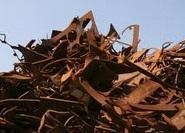Prices

March 28, 2019
June Ferrous Scrap Prices Tough to Call
Written by Tim Triplett
Ferrous scrap prices for June are difficult to predict, report Steel Market Update sources, who disagree on the degree to which the lower tariffs on Turkish steel will affect demand for scrap exports from the U.S. Most expect scrap prices to settle sideways next month after declines for most of the year, but a small increase or decrease is possible.
“Expectations for June are a mixed bag,” said one scrap dealer. “Recent sales to Turkey were up as high as $20/GT and most recently up $15/GT. Because of this, mills in the eastern U.S. are expected to have to raise prices to compete with the export market. The farther one gets from the coast, the weaker the market. Domestic demand seems to be dropping with many mills expressing worsening order books. Sideways or very close to sideways for obsolete scrap grades should be the market for inland mills. Primes should fare better with mills stocking up before the auto plant shutdowns.”
Ryan McKinley, CRU North America analyst, believes scrap will end up sideways to down $10/GT for June. “I lean towards the latter prediction after the U.S. announced it would halve finished steel tariffs on Turkey and eliminate tariffs on Mexico and Canada.”
The lower tariffs on Turkey will likely result in the resumption, to some extent, of finished steel imports—specifically rebar. This means increased demand from Turkey for U.S. scrap. But Turkish mills are only competitive with domestic U.S. mills and mills in Mexico as long as scrap prices remain under a certain level. “HMS export prices are back to around early-April levels, but I don’t think that will provide enough support for domestic scrap price increases in June,” McKinley added.
Two forces are working against the upward price pressure provided by the export market, he noted. First, finished steel (especially in Mexico) will be very competitive relative to U.S. domestic prices, which will drive U.S. prices lower. Mills are more likely than not to drop scrap prices again with the knowledge that finished steel prices are probably heading down. “At the same time, I have heard that inbound flows for dealers are off slightly, but I do not think it is enough yet to force mills to pay up,” McKinley said. “I do suspect this is the bottom for the scrap market should prices fall again in June. Flows will dry up, and the now open U.S. market for Turkish exporters will provide upward price pressure.”
Another dealer in the Northeast expects a no-worse-than-sideways market for June, “and the closer to the coast one sits, the more likely they are to see higher prices from May levels.”
He continued: “With the reduction of tariffs on Turkish steel several weeks ago, Turkish mills have returned to the U.S. and other markets to book scrap for what they hope to be better rebar order books. The 80/20 prices to Turkey have jumped about $20/ton since the U.S. domestic May buy period, but have fallen back about $5 in the last day or so. It’s still questionable how competitive Turkish steel will be in the U.S., but either way export scrap sales are still a better deal than the domestic market for now. Throw on top of that very weak inflows to dealer yards, planned Q3 downtime at Nucor’s DRI plant (and the need for Nucor to accumulate some additional prime scrap), and domestic mills’ inventory destocking over the last 60 days, and we should be starting to emerge from the downturn. Of course, weak domestic steel order books do not help, and we will need to see at what point finished steel buyers return to the market. Until then, I don’t see strong upside for scrap prices, so we should be relatively rangebound.”
Another scrap executive commented: “There has been scant speculation on the scrap market’s direction for June. Most think we have reached the bottom given the sharp rise in the export scrap market. In the last two weeks, prices for scrap delivered from the U.S. to Turkey have jumped just under $20/MT. This one factor could keep a weaker scrap demand in the U.S. at a sideways level. The mill buyers always use a weaker export market as a barometer to lower domestic scrap prices—and they usually do so, in spades. However, when things go the other way, they seem to drag their feet and finally give in to some less-than-matching increase. With prices down as much as they have been over the last quarter, I don’t feel the U.S. mills can demand lower prices in June.”
Commenting on pig iron, he noted that earlier this month several in-house steel mill traders finally forced down the pig iron market on the back of substantially weaker scrap prices. Consequently, they were able to conclude on multiple cargoes, mainly from Russia/Ukraine, with just one from Brazil. The prices averaged about $350-355/MT CFR, down from $365-370/MT previously. “So, the mills here are in pretty good shape now. After the tariff announcements regarding Turkey and NAFTA, the rise in export demand from Turkey and the notion that scrap had indeed bottomed, all the pig iron exporters now want more money for pig iron, at least $10/MT more. It could go higher since iron ore pricing is still holding at high levels and there seems to be less pig iron available going forward,” he said.







